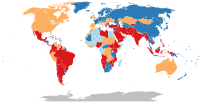
Photo from wikipedia
Early childhood education on sustainability has been an issue of high relevance in the last decade. In Spain, many different efforts have been made to increase children’s knowledge, skills, and… Click to show full abstract
Early childhood education on sustainability has been an issue of high relevance in the last decade. In Spain, many different efforts have been made to increase children’s knowledge, skills, and awareness related to sustainability issues. However, uncertainty about the effectiveness of education on sustainable development exists. This research reports on an exploratory study organized by the association that promotes aluminum packaging recycling in Spain (Arpal). Seven teachers were trained on sustainability in general and on aluminum packaging recycling in particular. These teachers defined and implemented a teaching unit with active learning activities that involved three preschools. Fifty-four children under 6 years of age, mainly 2 and 3 years old, along with their parents, participated in the teaching unit. Qualitative and quantitative methods (questionnaires, in-depth interviews, and focus groups) were carried out to assess the impact. The results proved that different partners, such as children, parents, teachers, managers, and associations, can work together with the common goal of improving education on sustainable development in early childhood, and all of them benefit from this collaboration. Moreover, this study confirmed that education on sustainability should be embedded in the daily routine of preschools. Furthermore, after the exploratory study, the teaching unit was implemented in 29 Andalusian preschools.
Journal Title: Sustainability
Year Published: 2019
Link to full text (if available)
Share on Social Media: Sign Up to like & get
recommendations!